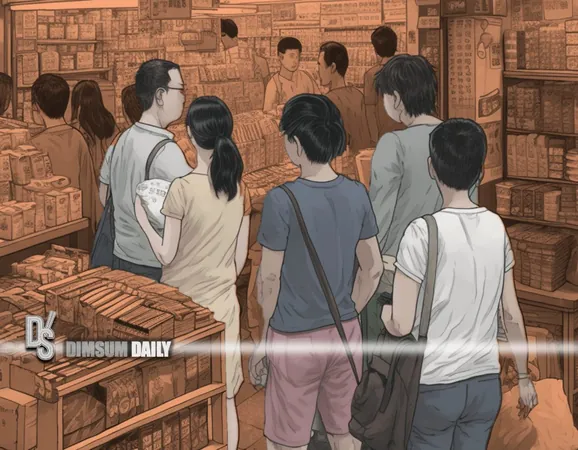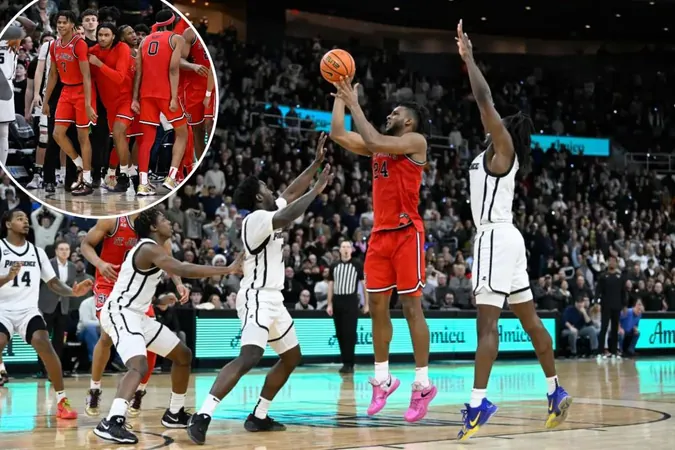
Hong Kong's Retail Revolution: How Value Shopping is Sparking an Economic Makeover
2024-12-26
Author: Kai
Hong Kong's Retail Revolution: How Value Shopping is Sparking an Economic Makeover
In the bustling streets of North Point, T.momo Shopping Mall has just opened its latest branch, and the excitement is palpable. Crowds flock to this value-driven retailer, not for luxury goods but for extraordinary deals on everyday items like HK$2 razors and HK$12 socks. This phenomenon is a striking symbol of Hong Kong’s ongoing retail transformation, where value shopping is becoming the new luxury.
The surge of so-called "grassroots retail" isn't just a reaction to the pandemic; it's a sweeping change reshaping the economic reality in Hong Kong. Consumers are gravitating towards budget-friendly options, discovering that affordable doesn’t mean inferior. From HK$39 two-dish meals to HK$70 quick cuts at salons, the city's retail standards are evolving.
Despite a reported 11.5% decline in traditional retail sales in May 2024, T.momo has seen rapid growth with 11 locations popping up within two years. This reveals a deeper transition in consumer habits, where middle-income shoppers are eschewing luxury brands in favor of budget alternatives that meet their financial needs.
Dr. Raymond Wong, a noted retail economist from the Chinese University of Hong Kong, states, "This isn't a sign of deteriorating wealth; it's a testament to the evolving consumer mindset. Value-seeking behaviors are now accepted across all income brackets." The festive launch of T.momo’s North Point store showcased this shift as patrons eagerly shopped for essentials—proving that what mattered was the cost-effectiveness rather than brand prestige.
The growing acceptance of budget shopping can be traced to Hong Kong's economic pressures, including sustained high property prices and a lackluster Hang Seng Index, which have collectively pressured household budgets. As a result, individuals who once sought out premium experiences are finding satisfaction in scoring great deals. The rise of the HK$70 haircut is just one example of this trend, as more basic barbershops replace upscale establishments, showcasing quick services at lower prices. Similarly, the "two-dish rice" eateries offer filling meals under HK$40 to an expanding customer base, solidifying this shift in the dining arena.
T.momo's innovative business approach, which includes direct relationships with mainland manufacturers and the strategic use of lower commercial rents, illuminates this emerging retail ecosystem. They have managed to price their products, such as a HK$2 razor set which costs HK$11 on Taobao, at a competitive rate that draws customers away from online giants.
Professor Terence Chong from the Chinese University points out the remarkable change in perception around bargain shopping: “These enterprises have not only succeeded in providing low prices, but they have also normalized budget-conscious shopping, making it fashionable.”
This retail shift changes Hong Kong’s economic identity in a significant way, moving away from its long-standing image as a luxury shopping haven to a diverse marketplace catering to various financial spectrums. While high-end retail still plays a role, the explosive growth of value-focused retailers indicates a permanent change in consumer preferences.
The long-term implications are profound, with traditional retailers facing new challenges. The permanence of this transition means that even with potential economic uplift, many consumers will likely continue to prioritize value shopping over previous luxury routines. “Once the bargain genie is out of the bottle, it doesn’t go back,” observes an industry analyst.
Interestingly, this retail evolution may bring unexpected benefits for Hong Kong’s economy. The emergence of sophisticated budget retailers has opened new avenues for employment and placed more affordable options within reach for everyday residents—forming a parallel economy that thrives on both necessity and consumer choice.
According to Dr. Wong, “Hong Kong isn’t losing its wealth; it’s gaining intelligence in spending. This evolving marketplace favors value and efficiency rather than just prestige, likely producing a more sustainable economic model moving forward.”
Looking toward 2025 and beyond, this shift shows no sign of slowing down. Adjustments in commercial rents are already occurring, with more mainland manufacturers seeking partnerships with budget retailers in Hong Kong. The success of entities like T.momo has inspired interest from new market entrants, hinting at an increased competition in the value retail sector.
Ultimately, this retail revolution showcases Hong Kong's resilience and ability to adapt in shifting economic landscapes. As the city transitions from a luxury shopping destination to a more inclusive retail ecosystem, it paves the way for a future where both luxury and budget coexist, fostering a sustainable economic environment. In this emerging framework, success will hinge on delivering real value to a savvy consumer base, strengthening Hong Kong's position as a global retail leader in the process.

 Brasil (PT)
Brasil (PT)
 Canada (EN)
Canada (EN)
 Chile (ES)
Chile (ES)
 España (ES)
España (ES)
 France (FR)
France (FR)
 Hong Kong (EN)
Hong Kong (EN)
 Italia (IT)
Italia (IT)
 日本 (JA)
日本 (JA)
 Magyarország (HU)
Magyarország (HU)
 Norge (NO)
Norge (NO)
 Polska (PL)
Polska (PL)
 Schweiz (DE)
Schweiz (DE)
 Singapore (EN)
Singapore (EN)
 Sverige (SV)
Sverige (SV)
 Suomi (FI)
Suomi (FI)
 Türkiye (TR)
Türkiye (TR)